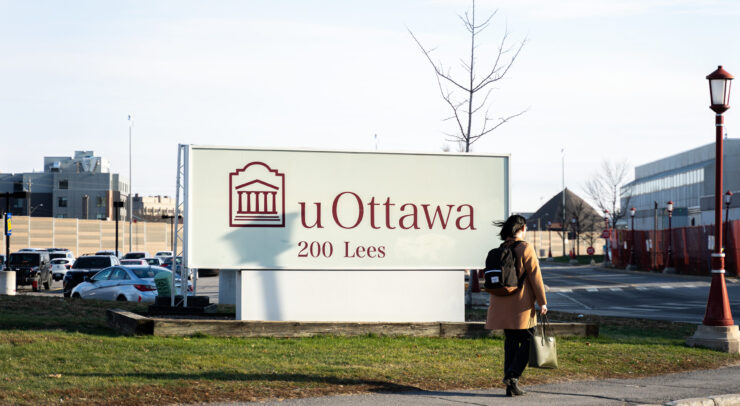Two racialized counsellors were hired according to the recommendations of the President’s Advisory Committee Report
The University of Ottawa highlighted the hiring of two racialized counsellors in its recent Annual Progress Report on Mental Health and Wellness. The two counselors are part of an overall counselling corps of 20 who serve the U of O community through the University’s health services.
Their addition marks a significant step in the right direction for the University, which has been making efforts to improve its mental health services since the beginning of the mental health crisis in the 2019-2020 academic year. Increasing representation was one of 12 recommendations identified in the initial President’s Advisory Committee Report on Mental Health and Wellness.
Students glad to see recommendations followed
Dina Babiker, vice-president of marketing and social media with the University of Ottawa Mental Health Awareness Society (UOMHAS), said in an interview her initial response to the development was “finally.”
“I think it’s such an obvious step that should have been taken a while ago, but I’m glad that it’s finally here,” she said. “I was disappointed it took this long, but I’m glad it’s finally here.”
Tim Gulliver, president of the University of Ottawa Student’s Union (UOSU) and a member of the President’s Advisory Committee on Mental Health and Wellbeing, agrees that the hiring was a long time coming.
“I think it’s really important. I think a lot of students will be surprised by the fact that there weren’t any racialized counsellors before,” said Gulliver in an interview with the Fulcrum. “It’s still a good thing to see the University moving in this direction. It’s something that a lot of students have been asking for and the University, to their credit, have been responsive to that.”
Understanding systemic problems, systemic solutions
The provision of mental health care services is rife with barriers. Obstacles such as stigma, accessibility, knowledge, and cost affect mental health care as a whole, but often disproportionately affect marginalized groups.
“Counseling is such a sensitive activity, it takes a lot of vulnerability from both sides,” said Babiker. “I know for me, personally, if I were to come to a counsellor who is not BIPOC and I had to explain my own struggles, it wouldn’t really feel like they fully understood my perspective.”
“I think it’s not fair to put that burden onto the person seeking out therapy or counselling to explain the context of their struggles or the context of their environment.”
Elizabeth Kristjansson, the University advisor on mental health and wellness, noted in an email to the Fulcrum that all counsellors employed by the U of O are “trained, sensitive to, and empathetic with” the issues faced by BIPOC students.
Gulliver lauds the University’s training efforts, but maintains that training alone cannot always provide the depth of understanding necessary to administer adequate support.
“I can speak to my own personal experience; I’m half-Asian and half-white. As an East Asian person, it’s always easier to connect with somebody who shares your lived experience. You feel like you’re more able to explore more nuanced concepts that relate directly into your life experience because your therapist understands that lived perspective as well,” said Gulliver.
“Given that our campus community is diverse along racial lines but is also comprised of students from all sorts of different faith groups and cultures as well, it’s really important that at all levels of the University administration, but especially when it comes to counselling, that students are able to have those options to feel more comfortable in those settings.”
Babiker adds that in addition to increasing comfort and understanding between students and their counsellors, it also helps encourage students to seek out counselling in the first place.
“I also find that if you don’t see yourself in the counsellors or the therapists, it’s really hard for you to want to go, it’s not very encouraging. Like if I personally see someone that’s Black or Muslim and I feel like I see myself there in that environment, I’m much more likely to seek that help out, because then there’s that lack of judgement,” she said.
Babiker added that representation is not the only way to increase the accessibility of mental health services for BIPOC students.
“Representation is the most important, but then following that, I would say that actually push those services to students. I personally didn’t know that they were hiring two BIPOC counsellors until recently. So, you can have the services there, but if no one knows about it, there’s no benefit to anyone,” she said.
Keeping the ball rolling
Azra Amiri is a fourth-year student in international development and globalization at the U of O. As a disabled woman of colour, she feels she has always been made to choose one aspect of her identity in counselling settings, to the detriment of her mental health. She is insistent that intersectionality in counselling is essential.
“We always imagine BIPOC students as their most extreme ethnic self, or extreme Western self, there is no room for people in the middle,” she said in an interview with the Fulcrum. “As a result, we get advice that caters towards one or another end of the diversity spectrum.”
When she was matched with a male, Congolese counsellor, she was hopeful that as a person of colour he would be able to understand the necessary context that informed her mental health concerns. But his understanding only extended so far.
“He understood, for example, my immigrant parents and how it’s difficult for them to raise a child outside of their birth country — I am the first one in my family to be born in Canada,” she said.
However, the added complexities of her gender were not well understood, and she felt his advice catered more towards her cultural than her gender identity.
“I’ve been telling everybody, I don’t want any male [counsellor] again. I thought he would understand what it’s like to be a marginalized person, but he didn’t see, I was a woman. BIPOC counsellors still have certain biases from where they come from.”
Amiri said that adding two racialized counsellors simply isn’t doing enough to cater towards students with intersecting identities and intersecting needs.
Babiker and Gulliver agree that while the addition is encouraging, it is not yet enough.
“Certainly our campus community is far more diverse than those proportions; two racialized counselors for a group of 20, walking around campus you notice pretty quickly that our campus is more diverse than that,” said Gulliver.
Gulliver added that he would like to see representation in counselling on campus extend to other marginalized groups, such as faith groups and the LGBTQ community.
“We can do more and we should do more,” he concluded.
“I personally haven’t seen enough being done for me to be satisfied. But then even a small step in the right direction is a small step in the right direction,” said Babiker.
“I absolutely don’t want to knock it down. But I think for a [U]niversity of this size, and [one] that knows the consequences — it’s not like, ‘oh, this happened on another campus,’ this happened on our campus — I think there’s a lot more that can be done. We should move away from performative acts and start doing things that actually help the students.”
Gulliver echoed her sentiments: “there was a spotlight that was shone on the significant gaps regarding mental health on this campus. This isn’t light stuff. We lost members of our community.”
Gulliver is hopeful that the diversification of the counselling staff at the U of O is nonetheless a sign that the University is moving in the right direction. In fact, he is confident that it is.
“What we have now is an opportunity: students made their voices heard, and they forced the University into action, and they’ve brought in people who, I’ve seen through their personal commitments, are dedicated to making change happen,” he said.
Gulliver added that one initiative he has raised with the committee is the implementation of good faith solutions to the issue of academic accommodation. The procurement of sick notes has long been a point of contention for students, as providing documentation of mental illness is both challenging and sensitive. Gulliver hopes that implementing more flexible requirements will help to eliminate situations that “turn professors into the judge and jury.”
Amiri thinks that more leniency with regard to leaves and extensions for reasons of mental health is critical. In addition to providing professors with a better background in issues of both diversity and mental health, she thinks a little sympathy would go a long way.
“I think that what they should do is show … the bias, and the anger that comes with being a diverse person or a marginalized person in a classroom, where you’re the only one who has this need,” she said.
Students have their say
The annual progress report recognizes that supporting student-led initiatives for mental health is an area that still requires improvement. Despite this, Babiker said that the UOMHAS is well-supported by the University. She encourages students to engage in their initiatives, such as UOMHAS’ student-written blog posts, which aim to make discussions of mental health and wellness more accessible and relatable for a student population.
Gulliver reaffirmed that improving mental health services is a priority of UOSU’s. In fact, he added that improving mental health services lies at the very foundation of the Union. A referendum that took place at the inception of the UOSU in 2019 voted to redirect more funds to Student Academic Success Services (SASS) for the hiring of more counsellors.
“Since the beginning of UOSU there was a commitment by the student body to do better by each other, to increase counseling resources. That’s one of the defining things of the UOSU to begin with,” said Gulliver.
He hopes that as these initiatives continue to gain momentum, the changes they are designed to enact will gain momentum as well.
“I think it’s one of those things that if you build it they will come. We’re trying to tear down the stigma when it comes to accessing mental health care, on campus and in society generally.”






